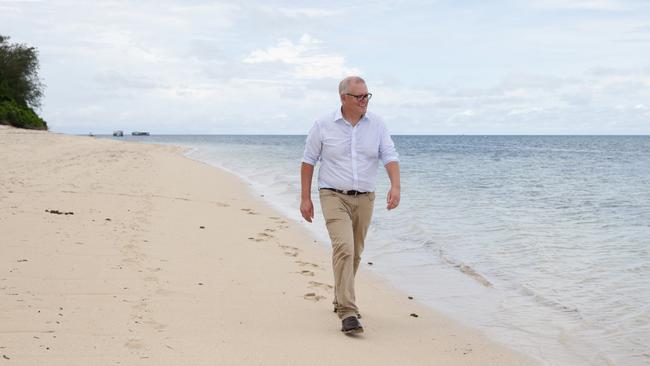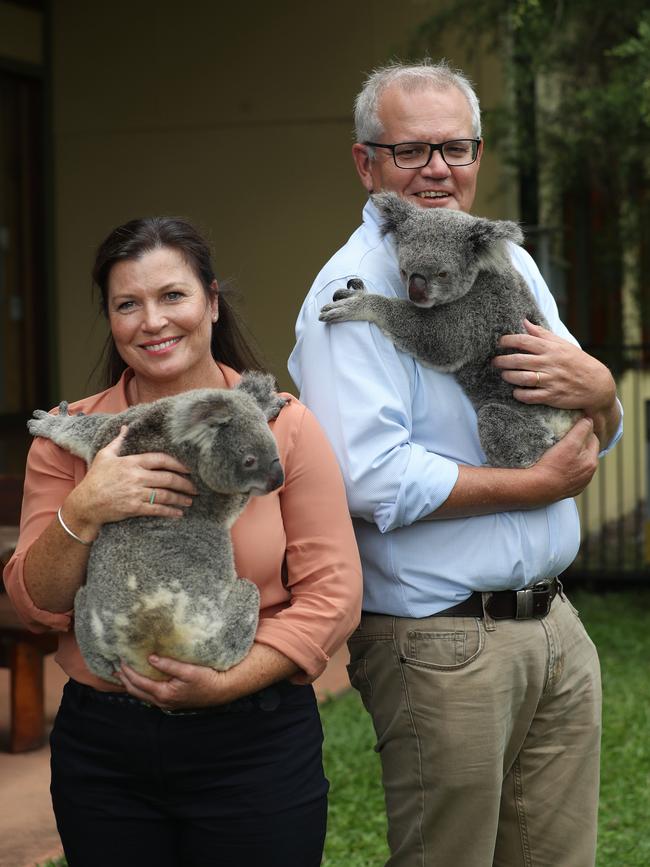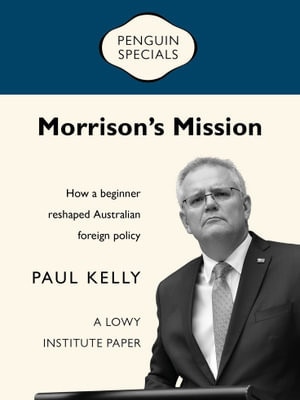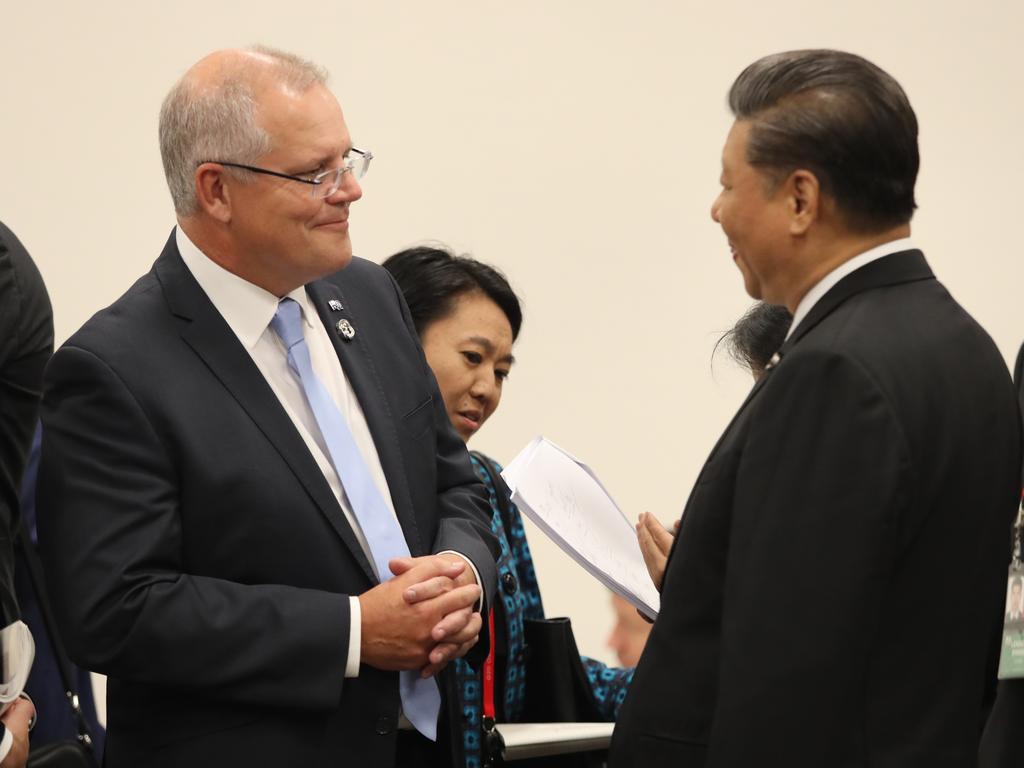Navigating turbulent seas
Scott Morrison has made some clumsy moves on the international stage but a new book says he has risen to the national security challenge

For decades now political analyst and The Australian’s editor-at-large Paul Kelly has written with gravitas and insight about our national affairs, political and economic. With his latest book, a concise tour de force, he has given us one of the clearest background briefings available on the sea change that has occurred in our foreign policy during the past half-dozen years. It should be read at every level of society. It is to the credit of the Lowy Institute that it has brought it out.
It achieves three things: in a climate of passionate polemic and rampant hype on social media, it is notably dispassionate and bipartisan in its coverage and objective in its analysis.
As we head towards an important federal election, it throws light on the vital issues of national security that should and will be debated in the months ahead and ought to shape voter opinions to a significant degree.
Kelly interviewed or read closely almost every significant participant in this debate, starting with Scott Morrison himself, and presented their opinions honestly and without evident passion or bias of his own.
These are the qualities of first-rate journalism – perhaps a dying craft.
He begins by telling us about Morrison’s ancestry and the formation of his world outlook, rather than simply wading straight into contemporary concerns. This was a thoughtful move. It grounds the actions of a prime minister much derided for his religious beliefs and “Scotty from marketing” reputation in a deeply rooted social and political outlook.
Kelly exhibits, at the very least, a human empathy with Morrison’s religious and political outlook. There is nothing unctuous or pandering in the character sketch so drawn. It pitches the Prime Minister to us as a man stemming from that robust Protestant tradition that has contributed so much to the development of the modern world.
READ AN EXCLUSIVE EXTRACT OF PAUL KELLY’S BOOK HERE
But the core of the book is about Morrison’s grasp of international relations and his emphatic defence of Australian sovereignty and liberal democratic principles on the world stage. Inheriting a sea change in our relations with China from the Turnbull government, Morrison found himself under great pressure to come to grips with the challenges involved.
By Kelly’s account, he may have made a few questionable tactical moves diplomatically but he has risen to the challenge robustly and deserves recognition for standing up to China unwaveringly when caving in to it would have had disastrous long-term consequences.

Quite early in the book, Kelly remarks that Morrison achieved two notable things last year: getting US President Joe Biden to “give the Quad momentum by inaugurating its first meeting at leaders’ level” and getting Mathias Cormann appointed secretary-general of the OECD, “overcoming a highly competitive field of candidates”. The latter Kelly describes as “the single most intense diplomatic campaign conducted by Morrison”, starting in May 2020. Paradoxically, Kelly then comments that the appointment is not one of strategic significance. Its significance lies in what it demonstrated about Morrison’s pull with foreign leaders.
But from that point almost the entire book is about Morrison and China. The chapter headings indicate the structure of his argument: A world transformed; The rise of national security; From amateur to activist; Morrison’s China challenge; Managing Trump and Biden; Navigating the Indo-Pacific; Morrison and AUKUS; and the Morrison Doctrine. If the overall argument could be summed up in three sentences, they would be:
● Morrison’s foreign policy emphasis on sovereignty, agency and liberal democracy, if pursued robustly, is likely to “significantly diverge from the Australian foreign policy tradition”.
● The challenge presented by the rise of China means that such a divergence was highly likely, one way or another.
● While the likes of Paul Keating, Hugh White, Geoff Raby and Allan Gyngell think Morrison is taking us down the wrong path, they have no coherent alternative strategy to suggest.
This last point is important because the language those four and others have been using, especially Keating and White, is deeply alarmist and, if they were right, there ought to be a more articulate policy dissent from the opposition benches. There isn’t. The opposition has been rather mute and hesitant in its approach to the subject, while broadly – to Keating’s exasperation – accepting the general direction of the Coalition’s foreign policy on a bipartisan basis.
Among the many figures interviewed by Kelly are Duncan Lewis, Mike Burgess and Dennis Richardson, not least because one of the issues he raises is the greatly increased role of our national intelligence agencies and the diminished funding for the Department of Foreign Affairs and Trade. He handles this thorny issue authoritatively and responsibly.

His citations from the public statements by Frances Adamson, former secretary of DFAT and before that ambassador to China, demonstrate that DFAT, though weakened, was on board with the general shift in our attitudes to China of recent years. The problem, as Adamson allows, was not primarily one of diplomacy. It was one of coming to terms with what China was doing here and in the near abroad. It was the intelligence services that were monitoring this most closely and that had to handle things such as cyber-warfare, information warfare, espionage and foreign influence operations.
Nowhere is this better illustrated than in Burgess’s advice to Malcolm Turnbull on 5G and Huawei, which Kelly details in chapter three. “Given Burgess’s technical advice,” Kelly writes, “Turnbull had to veto Huawei.” But nothing is more telling, in Kelly’s writing, than the judicious manner in which he listens to and reports conflicting opinions on what is at stake. He is never dismissive, never glib. Given the relentless suppression of debate in China, the debates we are having over our foreign policy are themselves an object lesson to China. Kelly parses that debate skilfully and honestly. For that reason alone, his highly readable book merits wide circulation.
Paul Monk is the Author of Thunder from the Silent Zone: Rethinking China (2005) and Dictators and Dangerous Ideas (2018), among many other books. He is a former head of the China desk in the Defence Intelligence Organisation.
Morrison’s Mission: How a beginner reshaped Australian foreign policy





To join the conversation, please log in. Don't have an account? Register
Join the conversation, you are commenting as Logout